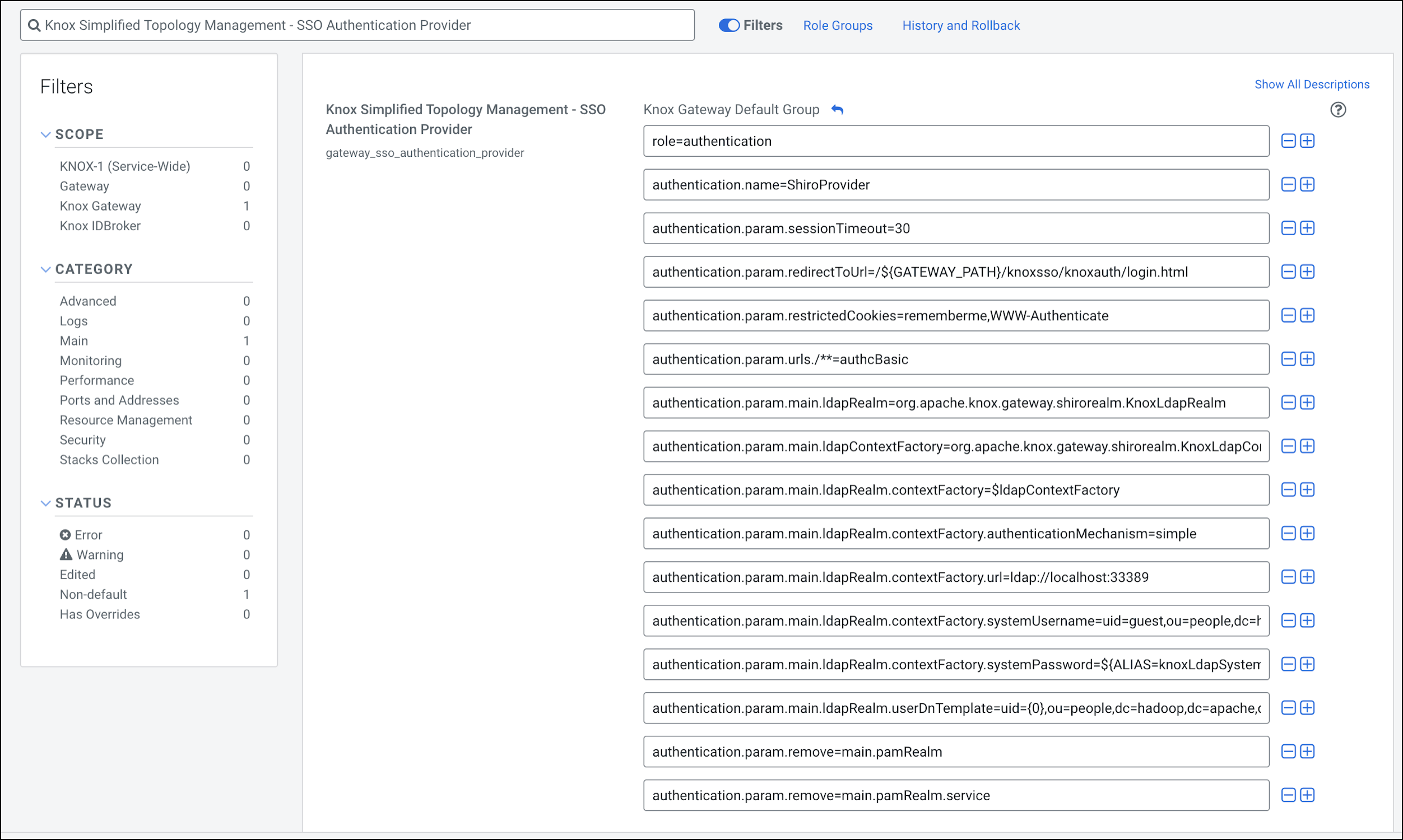Configure Apache Knox authentication for AD/LDAP
Knox authentication configurations for LDAP and AD in Cloudera Manager.
SSO authentication for AD/LDAP
In the following sample you will see how to change the PAM authentication (which
comes default with Knox) to LDAP authentication. It is as simple as removing the default PAM
related configuration in ShiroProvider and add LDAP related properties (e.g. with demo LDAP
server
configuration):

To
verify:
role=authentication
authentication.name=ShiroProvider
authentication.param.sessionTimeout=30
authentication.param.redirectToUrl=/${GATEWAY_PATH}/knoxsso/knoxauth/login.html
authentication.param.restrictedCookies=rememberme,WWW-Authenticate
authentication.param.urls./**=authcBasic
authentication.param.main.ldapRealm=org.apache.knox.gateway.shirorealm.KnoxLdapRealm
authentication.param.main.ldapContextFactory=org.apache.knox.gateway.shirorealm.KnoxLdapContextFactory
authentication.param.main.ldapRealm.contextFactory=$ldapContextFactory
authentication.param.main.ldapRealm.contextFactory.authenticationMechanism=simple
authentication.param.main.ldapRealm.contextFactory.url=ldap://localhost:33389
authentication.param.main.ldapRealm.contextFactory.systemUsername=uid=guest,ou=people,dc=hadoop,dc=apache,dc=org
authentication.param.main.ldapRealm.contextFactory.systemPassword=${ALIAS=knoxLdapSystemPassword}
authentication.param.main.ldapRealm.userDnTemplate=uid={0},ou=people,dc=hadoop,dc=apache,dc=org
authentication.param.remove=main.pamRealm
authentication.param.remove=main.pamRealm.serviceAfter
you finished editing the properties you have to save the configuration changes. This will
make the Refresh Needed stale configuration indicator appear. Once the
cluster refresh finishes, all topologies that are configured to use Knox SSO will be
authenticated by the configured LDAP server.
$ curl -ku knoxui:knoxui 'https://johndoe-1.abc.cloudera.com:8443/gateway/admin/api/v1/providerconfig/knoxsso'
...
}, {
"role" : "authentication",
"name" : "ShiroProvider",
"enabled" : true,
"params" : {
"main.ldapContextFactory" : "org.apache.knox.gateway.shirorealm.KnoxLdapContextFactory",
"main.ldapRealm" : "org.apache.hadoop.gateway.shirorealm.KnoxLdapRealm",
"main.ldapRealm.contextFactory" : "$ldapContextFactory",
"main.ldapRealm.contextFactory.authenticationMechanism" : "simple",
"main.ldapRealm.contextFactory.systemPassword" : "${ALIAS=knoxLdapSystemPassword}",
"main.ldapRealm.contextFactory.systemUsername" : "uid=guest,ou=people,dc=hadoop,dc=apache,dc=org",
"main.ldapRealm.contextFactory.url" : "ldap://localhost:33389",
"main.ldapRealm.userDnTemplate" : "uid={0},ou=people,dc=hadoop,dc=apache,dc=org",
"redirectToUrl" : "/${GATEWAY_PATH}/knoxsso/knoxauth/login.html",
"restrictedCookies" : "rememberme,WWW-Authenticate",
"sessionTimeout" : "30",
"urls./**" : "authcBasic"
}
API authentication for AD/LDAP
In the following sample you will see how to change the PAM authentication (which
comes default with Knox) to LDAP
authentication:
role=authentication
authentication.name=ShiroProvider
authentication.param.sessionTimeout=30
authentication.param.urls./**=authcBasic
authentication.param.main.ldapRealm=org.apache.knox.gateway.shirorealm.KnoxLdapRealm
authentication.param.main.ldapContextFactory=org.apache.knox.gateway.shirorealm.KnoxLdapContextFactory
authentication.param.main.ldapRealm.contextFactory=$ldapContextFactory
authentication.param.main.ldapRealm.contextFactory.authenticationMechanism=simple
authentication.param.main.ldapRealm.contextFactory.url=ldap://localhost:33389
authentication.param.main.ldapRealm.contextFactory.systemUsername=uid=guest,ou=people,dc=hadoop,dc=apache,dc=org
authentication.param.main.ldapRealm.contextFactory.systemPassword=${ALIAS=knoxLdapSystemPassword}
authentication.param.main.ldapRealm.userDnTemplate=uid={0},ou=people,dc=hadoop,dc=apache,dc=org
authentication.param.remove=main.pamRealm
authentication.param.remove=main.pamRealm.serviceEvery
change here goes directly into admin, metadata, and
cdp-proxy-api topologies.